What Is a Power of Attorney and Why Do You Need it?
Is there anything more valuable to a relationship than trust? Challenging to cultivate, in the right hands, its rewards are boundless. People with good relationships often rest easy due to their trust in others. When a crisis comes knocking at the door, they know that they can someone watching their back. With that said, even the simple act of trusting a loved one can be further extended through the delegation of power and responsibility. How is that done, you’re wondering? Why with the help of a power of attorney.

What Is a Power of Attorney and Why Do You Need it?
What Is a Power of Attorney?
A power of attorney is a legal document that designates a person’s authority to another person or group. It extends the individual’s thinking and decision-making capabilities to a trustee. However, the extent of the trustee’s abilities depends on the agreement details. Particular indications can either broaden or limit the trustee’s actions.
The Significant Other is The Significant Self
Finding a trustee is difficult even if penalty clauses are present since a breach will create repercussions. Thus, the significant others within a power of attorney are crucial as they will make and execute critical decisions on your behalf. And most probably, this significant other is an attorney. Plus, this lawyer will have an added task to his or her attorney timesheet. Sometimes, when starting a business, the power of attorney is still a necessity. Getting prepared is better than none, so securing another person to take responsibility when you are incapacitated is critical. It could be that you have grave medical concerns and you need someone to look after the finances and legal matters in your business. So for the record, you need this legality present in your documents checklist.
Don’t think that not you’re available or capable of running the show at all times. Sickness and accidents might happen that can disrupt whatever operations you are handling. Thus, it is highly vital to have a power of attorney to continue the business for you, especially those critical and non-negotiable financial and asset-related tasks. However, not all the times does one need to be incapacitated to use a power of attorney. In dire situations wherein one cannot decide, such as one being in the middle of a critical and serious meeting, or one is traveling to another country. Having someone to count on is crucial. Thus, you need another “you” to be that significant other.
Types of Power of Attorney
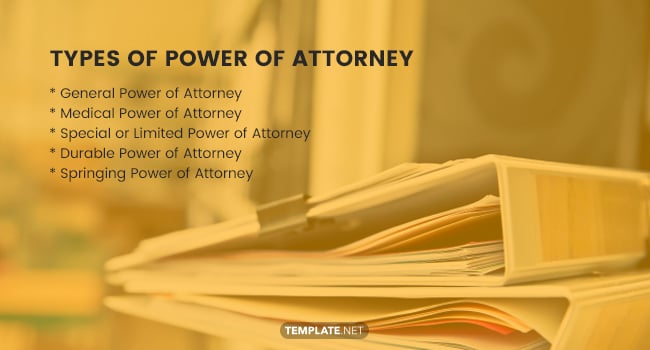
Different circumstances and purposes call for a suitable and specific power of attorney. And below is a concise list of the different types of power of attorney.
General Power of Attorney
A general power of attorney makes any principal select a trustee who could either be an agent or an attorney. Once this power is in effect, the trustee can make critical financial and legal decisions instead of the principal. However, among all other types, this power is executory, even when the principal is alive or competent. The other types will require a degree of incapacity.
Medical Power of Attorney
A medical power of attorney is crucial when health concerns are on the line. Delegating decision-making to a trustee regarding medical matters is essential under the situation that a principal is incapable of making any decisions. The need for this power usually happens when critical medical interventions require a legitimate consent-making person.
Special or Limited Power of Attorney
One-time big-time transactions concerning financial and legal matters, when in the absence of the principal, demands this type of power of attorney. If a previously-made commitment comes to fore with an incapacitated principal, then a delegated trustee can act accordingly. And since this power is special or limited, then it will only take into effect within the specific context in the agreement.
Durable Power of Attorney
Mental incapacity can be short term or long term. Those that are short term can be the result of being unconscious or suffering a momentary yet curable illness. However, the worse can happen, especially when one becomes mentally incompetent throughout the remaining lifespan. Thus, a durable power of attorney assures the trustee’s continuous role in the decision-making process. The stress in this power rests in the improbable return to sanity.
Springing Power of Attorney
This type of power of attorney is similar to its special or limited counterpart. However, this power will only take effect under strictly defined circumstances. Thus, creating this legal document takes serious attention to detail so as not to confuse the activation of its binding effect. Once the prescribed condition is in motion, then the power follows likewise.
When is a Power of Attorney Necessary?
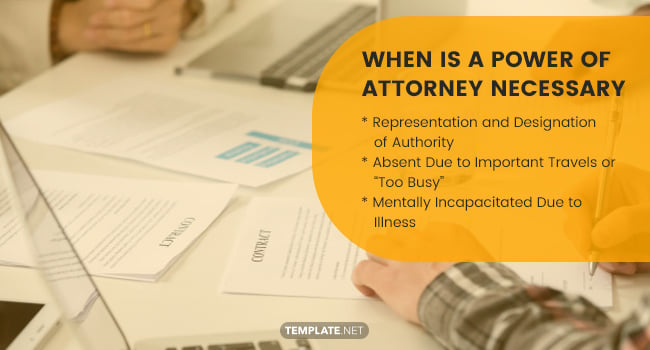
Particular cases require a power of attorney, which will prove beneficial for the principal. The legal document’s functions are critical, especially when executing or making crucial decisions on behalf of the principal.
Representation and Designation of Authority
This legal document is not giving rights to an alter ego. Far from it, the agent who will enact the critical decisions stands as the principal’s trustee. The delegation of authority must still serve the principal’s interest as must not stem from another independently thinking entity. That is why people who sought after power of attorney undergo a time-consuming process of finding a trustee.
Although the trustee stands similar to a representative, his or her powers are defined by the type of power of attorney issued. A representative stands on behalf of someone, but a trustee within this legal document can exercise crucial decision-making functions under the assumption that the trustee acts according to the principal’s frame of thinking. The following situations below show the power of attorney’s necessity.
Absent Due to Important Travels or “Too Busy”
Delegating responsibilities during your absence is essential as it assures business continuity. Critical decision-making tasks, such as managing financial accounts, need a power of attorney. Any financial institution would not cater to any person acting on behalf of your name and office without a power of attorney certification. Looking at your calendars and checking your schedules are vital so that you can estimate the need to have a trustee via power of attorney. Moreover, you can travel or leave the premises with comfort, knowing that someone is acting in your stead.
Mentally Incapacitated Due to Illness
Health concerns are alarming, especially when it leads to mental incapacity. Imagine the fate of your business or properties left to no one. What will become of your business without a trusted person to handle it? Always face the worst possibilities that can come so that you can prepare for them. Do take note that when mentally incapacitated, it would be difficult for you and whatever you left behind to act according to your wishes. Thus, make it known to concerned parties before any actual mental incapacity befalls on you.
Granting that mental incapacity is temporary, at the very least, you have someone or some group of people working on your behalf until your return to normalcy. It would be a disaster if you returned having to deal with problems that occurred while incapacitated. And assure that a trustee continues financial operations through the said legal document. Even though you may never know in full already what happens to your business during your sorry mental state, at least the assurance settled any questions coming from concerned parties. Moreover, a power of attorney guarantees any person involved with your properties and businesses a trustee.
Why Do You Need A Power of Attorney?
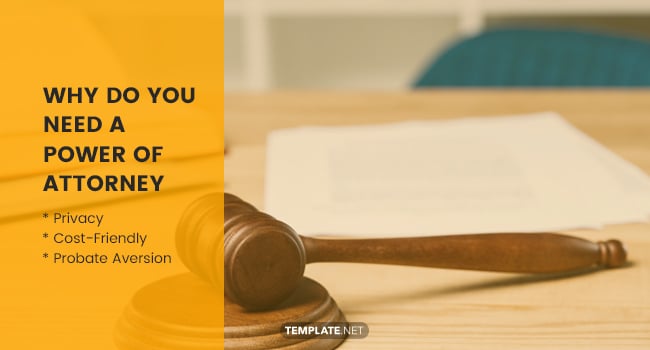
Hearing the word power has a remarkable effect because if you have one, then there are things you can do. More so, do take note that power is also a responsibility. Thus, when you delegate power to a trustee, you give them authority while giving them a responsibility. But why do you need power of attorney? Here are the following reasons that will suffice.
Privacy
Once there is no power of attorney, any proceedings about assets will undergo the court; thus, making the assets under publicity like some court process. The presence of a power of attorney will rule out the publicity as a trustee is present to administer the issue. Since a principal entrusted the trustee to take care of critical matters, then the legal document enforces the trustee’s function towards the case; thus, having a safe zone for confidentiality.
Cost-Friendly
Going through a lot of legal action before executing anything will cost much. In your absence, legal firms and the court will derive service payment via the funds within your cache. And without a power of attorney, the intermediary power of the state will spend the funds you have. However, the presence of the trustee can bypass these processes as he or she stands as the appropriate person in your stead.
Although having a power of attorney will still cost you some money, having one will ensure no further expenditures for rigid court proceedings.
Probate Aversion
Ever heard the line “on probation”? All your assets, such as your businesses and properties, will be on probate when there is no power of attorney. In the absence of the principal, primarily upon incurring mental incapacity, nobody is going to decide on the principal’s behalf. Thus, business operations, financial matters, and other deliberative situations will halt. Although some people may resort to the will, the will alone cannot entrust operational concerns. It could be enough to delegate ownership and partitions, but not the decision-making part while the principal is alive. The crucial element with a power of attorney is that a trustee can act and not just a mere representative and beneficiary. Once you have a power of attorney, averting probate over all your assets will be a cinch.
Difference between Power of Attorney and Will
A fine line has to be present between a power of attorney and a will. Although both take primary function in the absence of a principal, the scope differs entirely. The will only take into effect after the death of the principal or the author; however, a power of attorney is in motion while the principal is alive. Whether physically absent due to circumstances or mentally incapacitated, a power of attorney assures the presence of a capable trustee.
How to Apply for a Power of Attorney
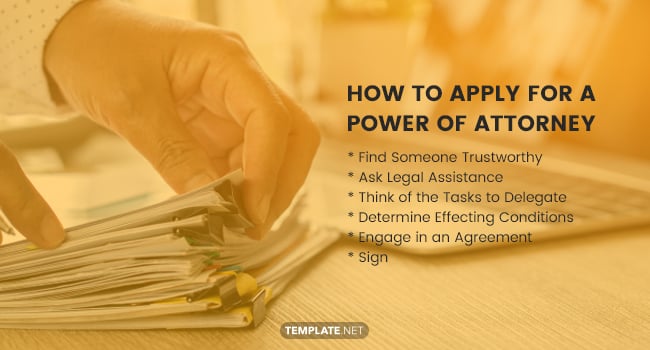
Securing the power of attorney is not a mere delegation of a friend or loved one. The process is intricate to assure all parties fair proceedings when a need arises. Plus, without the necessary formalities, any decision or action created by a self-professed trustee is null and void. Thus, follow the steps below to get the much-needed legal document for your needs.
Find Someone Trustworthy
Above all else, you should be ready to name someone or a group of people to be your trustees. Thus, find the time to talk with potential candidates to your trust list. Make sure that they have clean records that can assure their reliability and credibility. And there is nothing surer than having that someone you can entrust crucial tasks.
Ask Legal Assistance
Delegating tasks to someone, especially handling financial matters and properties, is no walk at the park. Plus, you are dealing with concerns that need the law’s protection and recognition. Thus, having legal assistance is necessary. Concerns regarding contracts and properties have legal proceedings that demand legal knowhow.
Think of the Tasks to Delegate
As to the extent of the power of attorney, it is a matter of how much power you are going to delegate. Do remember the different types of power of attorney which cover different areas in respective circumstances. Although the power of attorney has expected function delegation, it is still important to sort out specifics that you want the document to depict.
Determine Effecting Conditions
Not only can you limit or expand delegated functions, but also as to when the power of attorney will take effect. Think of the several conditions that might be possible for you such as a fully-booked travel calendar. However, it is also typical yet precautionary to include clauses that indicate either one is dead or mentally incapacitated.
Engage in an Agreement
It is now to sit down and talk with all concerned parties in the presence of a legal assistant. Make sure to engage in a thorough discussion about the nature of the proceedings to leave no questions behind. Do smoothen rough edges and always secure an attorney’s approval.
Sign
What is a formal and binding document without signatures? Moreover, after signing, a notarized letter or certificate is essential to request from the notary public to further authenticate the document. Make sure that all of these are present set motion to a power of attorney.
Revoking Power of Attorney
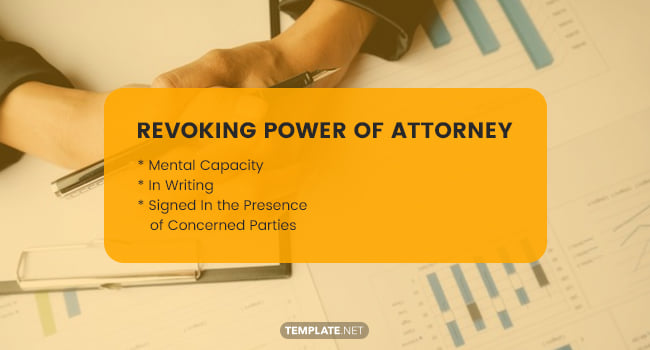
For convenience and security reasons, revoking power of attorney is available. Revocation does not only mean that something awful happened between parties. It could also mean an honorable ending for the binding agreement. Some powers can extend even beyond death, while some can end whenever the principal has reasons to do such. Establishing a power of attorney undergoes a process, so too is the revocation of a power of attorney. Here are the following considerations that you need to consider in the process.
Mental Capacity
A revocation should happen by will. As long as the principal is mentally capable, no problems will occur in the process. Moreover, revocations should also need a formal reason for termination; thus, asserting the need for mentally competent people to initiate the process.
In Writing
Formalities must be in print; thus, putting the move to writing is making the process official. Once documented, keeping it in a tight vault secures it. Moreover, you need to duplicate the document for other parties as well. There is no better memory and referable item than a printed document.
Signed In the Presence of Concerned Parties
Revocation does not happen via the principal’s gut feels. Just like the process of creating a power of attorney, convening with concerned parties is also necessary during revocation. The move is not a blind decision of one person. Since everybody is in agreement with the creation of the legal document, the same should happen in its revocation.
Doesn’t it feel great to know someone has your back? As you know by now, having an appropriate power of attorney can magnify that feeling of assurance two or even three-fold. Just as trust binds our relationships, so does the document binds our affairs together in a neat and organized fashion. Always see to it that your critical transactions are in safe hands because any trustee you pick is acting as if he or she were you.






